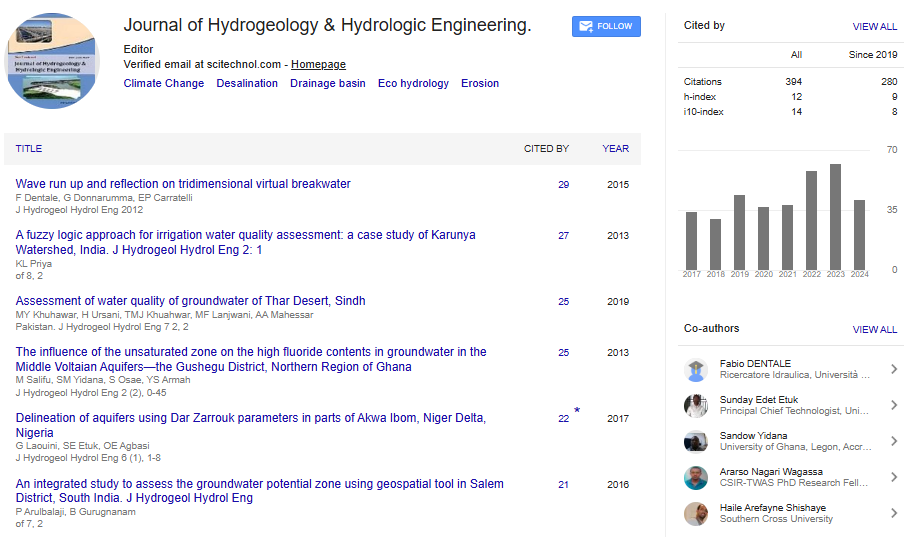Opinion Article, J Hydrogeol Hydrol Eng Vol: 12 Issue: 3
Sources of Ground Water Contamination and Management
Qingmin Meng*
Department of Civil Engineering, University of Nottingham Malaysia, Selangor, Malaysia
*Corresponding Author: Qingmin Meng
Department of Civil Engineering
University of Nottingham Malaysia
Selangor, Malaysia
E-mail: mengq56@gmail.com
Received date: 15 May, 2023, Manuscript No. JHHE-23-107523;
Editor assigned date: 17 May, 2023, PreQC No. JHHE-23-107523 (PQ);
Reviewed date: 31 May, 2023, QC No. JHHE-23-107523;
Revised date: 08 June, 2023, Manuscript No. JHHE-23-107523 (R);
Published date: 16 June, 2023, DOI: 10.4172/2325-9647.1000272
Citation: Meng Q (2023) Sources of Ground Water Contamination and Management. J Hydrogeol Hydrol Eng 12:3.
Description
Groundwater, hidden beneath the Earth's surface, plays a vital role in supporting life and sustaining ecosystems. It serves as an essential source of drinking water for billions of people worldwide and supplies irrigation for agriculture, making it essential for food production. However, in recent years, concerns about the quality of groundwater have grown due to various anthropogenic and natural factors. Understanding and monitoring groundwater quality is essential to protect human health and safeguard the environment. In this article, we delve into the intricate world of groundwater quality, exploring its sources, challenges, and the measures required to preserve this invaluable resource.
Groundwater quality refers to the chemical, physical, and biological properties of water found underground. It is influenced by natural processes, such as weathering and geological formations, as well as human activities, including agriculture, industrial practices, and urbanization. The quality of groundwater can vary significantly from one location to another, depending on the geological composition of the area and the degree of contamination present.
Sources of groundwater contamination
Agricultural practices: Pesticides, herbicides, and fertilizers used in agriculture can infiltrate the soil and leach into groundwater, leading to contamination.
Industrial activities: Improper disposal of industrial waste, chemicals, and effluents can seep into the ground and pollute groundwater resources.
Landfills and waste sites: Landfills and improperly managed waste sites can release harmful chemicals into the groundwater, posing severe health risks.
Urban runoff: Urban areas with extensive pavement and impervious surfaces can cause contaminated water from roads and industrial areas to flow into groundwater sources.
Natural causes: Certain naturally occurring minerals and elements in the geological formations can also influence groundwater quality, such as arsenic and fluoride.
Impact on human health and the environment
Contaminated groundwater poses a significant risk to human health. Drinking water containing harmful substances like heavy metals, nitrates, or microbial contaminants can lead to various health issues, including gastrointestinal problems, neurological disorders, and even cancer.
Moreover, the environment suffers adverse effects from groundwater pollution. Aquatic ecosystems, plants, and animals relying on groundwater can be harmed or even face extinction due to toxic substances.
Monitoring and remediation
Regular monitoring of groundwater quality is essential to identify potential issues and take timely action. Water sampling and laboratory analysis allow authorities to track changes in groundwater quality and assess contamination levels.
Remediation techniques are employed to restore contaminated groundwater to acceptable levels. These methods include pump-andtreat systems, in-situ bioremediation, permeable reactive barriers, and phytoremediation, among others.
Sustainable management and conservation
To ensure a sustainable future, preserving groundwater quality is of utmost importance. Implementing proper land use planning, responsible agricultural practices and better waste management can significantly reduce groundwater contamination risks.
Encouraging the adoption of cleaner industrial technologies and promoting public awareness about the importance of groundwater protection are equally vital in safeguarding this precious resource for generations to come.
Conclusion
Groundwater quality is a delicate and vital aspect of our environment. Protecting it requires a collective effort, involving governments, industries, communities, and individuals. By understanding the sources of contamination, monitoring water resources regularly, and employing effective remediation techniques, we can pave the way towards a cleaner and safer groundwater supply. Preserving groundwater quality is not just a responsibility but an obligation to secure a sustainable future for humanity and the planet.
 Spanish
Spanish  Chinese
Chinese  Russian
Russian  German
German  French
French  Japanese
Japanese  Portuguese
Portuguese  Hindi
Hindi 
